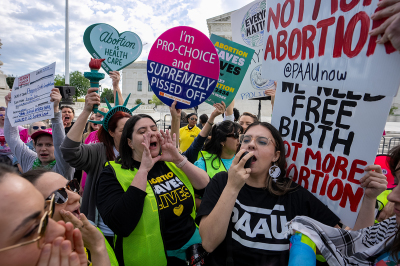
The abortion issue continues to roil American society with passionate pro-life and pro-abortion factions contending for hearts and minds in virtually every social segment and every geographic section of American society.
Let us all understand what this debate reveals about American civilization in 2025. As a people, we are engaged in a discussion and a debate that will determine who we are and who we shall become as a people — as a nation.
As far back as the latter quarter of the 20th century, the late, great Francis Schaeffer told us that the fundamental fight between traditional Judeo-Christian convictions about human life, dignity and modern dehumanizing philosophies would be “the greatest moral test to be put before us in this century.”
Schaeffer engaged in a spirited debate with the behavioral psychologist B. F. Skinner (at the time, one of the most influential thinkers on the American college campus). Skinner had written a book, Beyond Freedom and Dignity (1971), arguing that “freedom” and “dignity” were “outmoded” concepts that humanity could no longer afford. Schaeffer responded with Back to Freedom and Dignity (1972), defending these concepts as essential to human personhood.
The abortion issue is inextricably intertwined with the debate of who and what is a being. The American liberal and legal establishment tried mightily to take the issue of abortion away from the American people through Supreme Court decisions like Roe v. Wade (1973).
Through the heroic actions and activities of tens of millions of religious pro-life Americans, Catholic and Protestant over two generations — with the assistance of divine providence — the Supreme Court finally overturned Roe with its Dobbs v. Jackson Women’s Health Organization (2022) decision. Many pro-lifers understood what many Americans did not — that overturning Roe did not abolish abortion — it just reestablished the people’s right to restrict and abolish abortion.
As more and more pro-life Americans realized they still had to win the battle for hearts and minds in order to restrict and outlaw abortion on demand, they became increasingly frustrated, perplexed and angry.
Sadly, the current state of American public opinion remains deeply divided on the legality of abortion. Opinion is not only divided at the national level. It is divided at the sectional and state levels. Abortion restriction has much more support in “red” states than in “blue” states.
If pro-lifers want to severely restrict abortion in America, they must convince millions more of their countrymen to agree to support laws that would do so. In a representative republic, there is no alternative.
That means many things. One, we must do everything we can to humanize the fetus as a miniature human being. Second, we must see mothers who have abortions as victims. Most women who have abortions don’t want to have them.
In fact, a Charlotte Lozier Institute study found that almost 70% of abortions “are coerced, unwanted or inconsistent with women’s preference.” This statistic is one of the many gems found in David Closson’s Life After Roe: Equipping Christians in the Fight for Life Today.
Closson’s book is a treasure trove of pro-life facts and clearly reasoned arguments advancing the pro-life cause. Anyone reading Closson’s book will be well-equipped to debate the pro-life issue.
Perhaps the most important contribution made by Closson, however, is his Appendix 3, “An Incrementalist’s Response to Abortion Abolitionists.”
Abortion Abolitionism rose to new heights in America in the wake of Roe’s fall. Abolitionists only advocate for laws that eliminate legal abortion — no compromise, period! So abolitionists would reject any restrictions short of complete abolition — no six-week bills, no 12-week bills, and no heartbeat bills!
By insisting on an all-or-nothing approach, abolitionists guarantee no significant restrictions on abortion. If they insist on “all or nothing” in a society where approximately half the country favors at least some abortions, you will have no restrictions, and the human sacrifice of our unborn will continue without exception.
The situation is analogous to a person coming to the banks of a river just as a bus full of elementary school children plunges into the river. The abolitionist’s position appears to be that we shouldn’t save any of the children if we can’t save all of them. The incrementalist’s position is that we plunge in and save as many children as we can, and then go back for more. This debate is real, and the lives of real children are at stake. I vote to save as many children as we can NOW!
Dr. Richard Land, BA (Princeton, magna cum laude); D.Phil. (Oxford); Th.M (New Orleans Seminary). Dr. Land served as President of Southern Evangelical Seminary from July 2013 until July 2021. Upon his retirement, he was honored as President Emeritus and he continues to serve as an Adjunct Professor of Theology & Ethics. Dr. Land previously served as President of the Southern Baptist Convention’s Ethics & Religious Liberty Commission (1988-2013) where he was also honored as President Emeritus upon his retirement. Dr. Land has also served as an Executive Editor and columnist for The Christian Post since 2011.
Dr. Land explores many timely and critical topics in his daily radio feature, “Bringing Every Thought Captive,” and in his weekly column for CP.

















